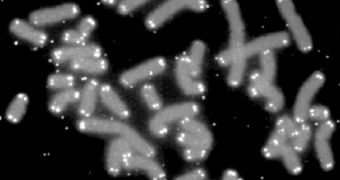One of the most important components of chromosomes are telomeres, structures located at their ends that look like caps, and whose role is to protect the genes inside. These formations become shorter with each cellular division, and eventually force the cell to either remain in a vegetative, elderly state for a long time, or triggers the cell death mechanisms. A recent investigation by Swedish researchers, based at the universities of Umea, Stockholm, and Linkoping, suggests that longer telomeres appear to hinder the quality of memory in adulthood, ScienceDaily reports.
According to the Swedish Research Council, the new research is a part of the major Betula Project, one of the ten most ambitious research projects in the country. Its goal is for researchers to gain more insight into how memory evolves as people get older. Needless to say, there are probably hundreds of factors that dictate the overall memory capacity an individual would be left with in his or her senior years. For the purpose of this study, some 427 test participants were surveyed. None of them were demented at the beginning of the study, and participants are age 41 to 81 years old.
The new investigation focused on the actions that different forms of the apolipoprotein E (APOE) had on memory. The researchers also looked at whether test participants with different variants of the protein had varied telomere lengths. The team then correlated these data with a series of memory tests, which all test subjects had to undergo. The work was prompted by the fact that previous investigations managed to establish a clear link between the protein APOE 4 and an elevated risk of developing dementia and cardiovascular diseases.
Generally, the team learned that those with the APOE 4 protein tended to have longer telomeres than people sporting any other variant of the molecule. It was additionally established that the most marked differences in telomere lengths were recorded in the youngest participants to the study. When the seniors of the study were analyzed, the differences were less significant, but proportionally the same. The Swedish team says that the APOE protein plays an important part in transporting blood fats around the body, and adds that additional investigation might clear the connection that was discovered between the molecule and poorer memory.

 14 DAY TRIAL //
14 DAY TRIAL //